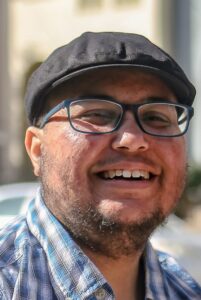As an autistic person myself, I do not take being verbal for granted and I understand how powerful writing can be to express oneself. I understand Pam’s saturation in books, her safe places to escape to and think, because I had mine too and still do. I identify with the types of “beyond the norm” girls (Alice, Laura, Anne) Pam mentions here. I would add Pippi Longstocking and the animated PowerPuff girls to the list! Enjoy Pam’s perspective; it was another place and another time but an autistic girl wondering where her very own like-minded peers are, is relevant to all of us when we were girls, wondering the same thing. – Kimberly Gerry-Tucker
By Pamela Urfer
Maybe it was a good thing that no one knew about autism in 1942, the year I was born. There was no word or explanation for autistic behavior other than ‘weird’ or ‘strange’ or, the worst of all, ‘different.’ I know other people thought I was strange. My mother called me ‘antisocial.’
And she was right. I was. I didn’t enjoy the company of other children, with one or two exceptions. Those girls might also have been labelled ‘weird,” and my mother rejected them as ‘unsuitable’ friends. Most of the ‘suitable’ girls had interests I couldn’t comprehend – horses when they were young, pop singers or boys as they grew older. Hanging out at the swimming pool – looking for boys. Their parties were painful to attend and I usually ended up in a corner somewhere, my nose in a book, which I paid for later if my mother found out.
I always had my nose in a book. Reading was my lifeline. I read in the bathtub, at the dinner table (that wasn’t tolerated,) under the bedcovers with a flashlight, out in the woods near an abandoned horse stable that was my hideout. I read to try to make sense of a world that seemed beyond my ability to understand. People seemed ‘strange’ to me and I hoped reading about their habits and hopes and motivations might help me survive.
Rather than trying to be like other girls, my role models were the heroes in children’s books. Most of them were also oddities – from Anne of Green Gables who was teased because she was an orphan with carroty hair, to Alice who broke all the rules in Wonderland, to Laura Ingalls, a tomboy at a time when girls were supposed to be proper, to Madeline in Paris, thinking outside the box, to Ferdinand, the young bull who like to sit just quietly and smell the flowers.
There was one thing these misfits had in common. They were brave, noble and caring, protecting the vulnerable, facing down bullies, standing up for right even when it got them into trouble. Even in hard circumstances, when everyone they knew disapproved of them, they followed their conscience. My favorites were those clear-eyed visionaries who looked at the world and saw the best it could be.
I tried hard to follow their example. I stood up to the bullies – and was punished for it. I defended the third graders who had their Halloween candy stolen by the big boys – and got no thanks, except from the little boys. I befriended the girls no one else loved – and was shunned by the popular girls as a result.
You could say that by basing my actions on fictional characters, I was out of touch with reality. Perhaps I was. Along the way, I bumped up against Reality many times and took some pretty hard knocks from it, too. (Remind me to tell you about the time I make a movie.) Still, I felt then, as now, that too much adherence to Reality results in conformity, cowardice and a tawdry lifestyle. I wanted to be better than that. For whom were these books written, if not for me?
Header Photo: Pamela Urfer, circa 1950
***
I am a seventy-five year old woman living on the spectrum. My symptoms have receded as I’ve grown older but it’s been a long, interesting journey. I’ve been involved in the arts and theater my whole life. I have been happily married for fifty-two years and have three children and five grandchildren.









From one to another, I say “Good for you Pamela.” Well done…
I must say that being born so long ago it was easier to hide, easier to mask. Maybe that is what the world is about now — allowing all this and that, that was secret and kept hushed or bullied to come out into the sunshine and shine.
Most of the world seems to be standing in someone else’s light.